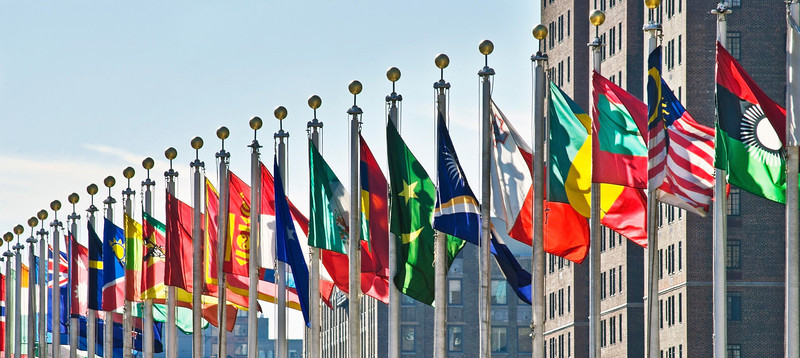16.03.2020 - 07:59
|
Actualització: 16.03.2020 - 08:59
Fernand de Varennes, the Special Rapporteur on minority issues for the United Nations, has made his report public after visiting Spain on 14 and 15 January last year. The publication of the report has caused an uproar in Spanish diplomatic circles. De Varennes visited Madrid where he met with representatives of various ministries and Spanish government officials before travelling to Catalonia, the Basque Country, Galicia and Andalusia. Although he did not visit the Balearic Islands and the Valencian Country, he also contacted several people and groups from there, in addition to Roma and immigrant communities.
The report aims to ‘promote the full and effective realization of the human rights of minorities’. What has displeased Madrid is that it refers to the UN’s definition of a minority. The UN defines a minority as any ‘ethnic, religious or linguistic group, representing less than half of the rest of the population’ and where members share cultural, religious or linguistic traits. For the first time then, the United Nations has officially recognized that, in spite of the fact that they constitute a majority in their respective parts of Spain, Basques and Catalan, among others, are a national minority which ought to be treated as such.
The report begins by mentioning that the Spanish state is subject to the vast majority of international human rights treaties, and highlights the ‘progress’ which has been made since the end of the Franco dictatorship. Nevertheless, the rapporteur does not mince his words when he goes on to declare that human rights issues in relation to minorities at times feel like an ‘unfinished story’, and that he has detected ‘gaps’ and ‘omissions’ regarding a number of issues, such as language and education, which may have a negative impact on minorities. He wraps up by warning the Spanish authorities that ‘additional efforts and changes’ will be needed since some ‘unfortunate developments need to be addressed’.
What are these unfortunate developments? For starters, the way languages are treated. Varennes feels that in the areas of education and the judiciary, national minorities face ‘a disconnect between the claimed status of co-official languages’ and the extent of their actual use and the implementation of legislation governing the use of these languages. He also states that, in Catalonia and the Balearics in particular, there are increasing obstacles to the use of minority languages in a range of public services and that this can often lead to discriminatory practices. The report is highly critical of the discrimination faced by speakers of Spain’s minority languages, which means it is almost impossible to guarantee their right to speak in their language in a court of law.
In a similar vein, the document also considers that the prominent legal and constitutional position of the Spanish language is negative because it threatens other languages. According to Varennes, ‘this is partly due to recent judicial pronouncements that have emphasized the prominent constitutional position of Spanish’. The reports criticizes this state of affairs as it may cast doubt on the right of minority language speakers to be educated in their own language. He adds that this retrograde step in guaranteeing the rights of linguistic minorities may even violate the Spanish constitution, and specifically mentions the recent attempt to legally oblige Catalan schools to teach at least 25% of their lessons in Spanish. Varennes refers to the fact that numerous international organisations have ‘lauded’ the Catalan language immersion approach, while declaring that all children in minority language territories should have the opportunity to learn them, and rejecting the idea that ‘teaching in a minority language is discriminatory’. In reference to this question, the rapporteur finds it unfortunate that the trilingual model [Spanish, Catalan and English] ‘has significantly reduced teaching in the co-official minority language’, especially in the Balearic Islands.
Opposed to the crime of sedition
The rapporteur’s report states that, on the subject of Catalonia’s independence bid in October 2017, he has identified numerous instances of what appears to be ‘an increase in hate speech, vilification, vandalism, physical threats and even assaults against the Catalan minority’. Furthermore, he remarks that there is evidence to suggest that ‘the authorities are neither responding to nor probing said allegations’. Verennes adds that this contributes to an ‘atmosphere of increasing intolerance against minorities and of nationalistic vitriol’, while noting that he has observed ‘significant distrust of the police and even the judiciary’ among minority communities. As a result, he urges Spain to take heed and take action.
The rapporteur also ‘joins colleagues who have already expressed grave concerns’ about the criminal charges brought against ‘political figures and protestors belonging to the Catalan minority’ and the negative message this ‘sends to the rest of the national minorities’. He urges the Spanish state to review the legal definition of sedition and states that ‘political dissent’ ought not to give rise to ‘criminal charges’.
Spain’s furious response
After receiving the UN Rapporteur’s report, Spain responded with a highly charged official letter criticizing the definition of a ‘minority’ employed by Varennes and, since most of the report is based on this definition, rejecting it outright. The Spanish government believes that the official definition used by the United Nations is ‘overly-simplistic’ and ‘mathematical’ and it leads to ‘absurd conclusions’. It also claims that such a concept of minorities is overly linked to ‘identity and may jeopardize individual freedoms’, an argument which has been popularised by the Spanish right.
In a series of points, Spain tries to dismantle each and every one of the report’s conclusions. It is at pains to deny the fact —though it goes against the evidence— that minority languages face a series of obstacles, and uses the Spanish Constitution as a buffer to defend the trial against the independence process in Catalonia. The Spanish government has no qualms about lying when it writes that there are no barriers to using Catalan in court, contrary to the everyday reality of the judicial system in Catalonia.


